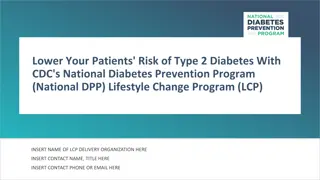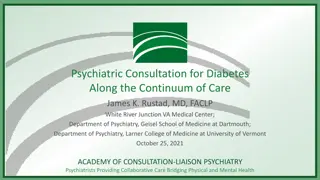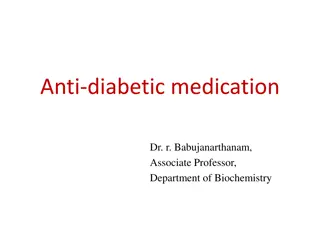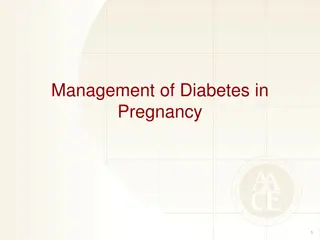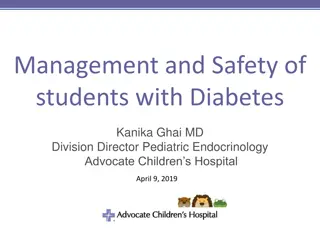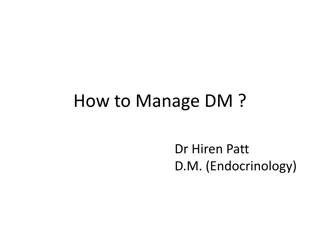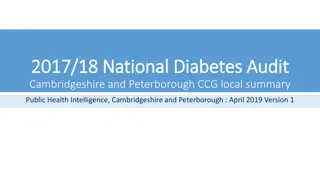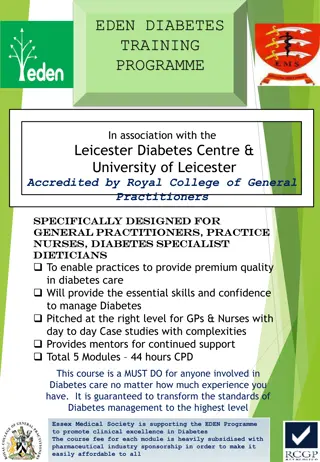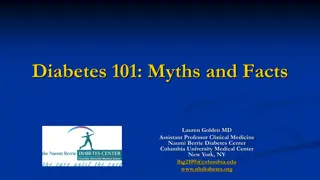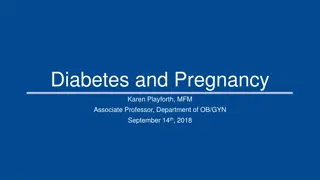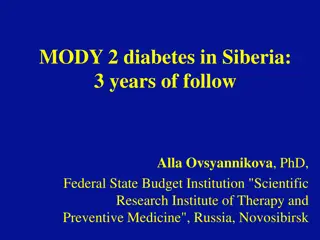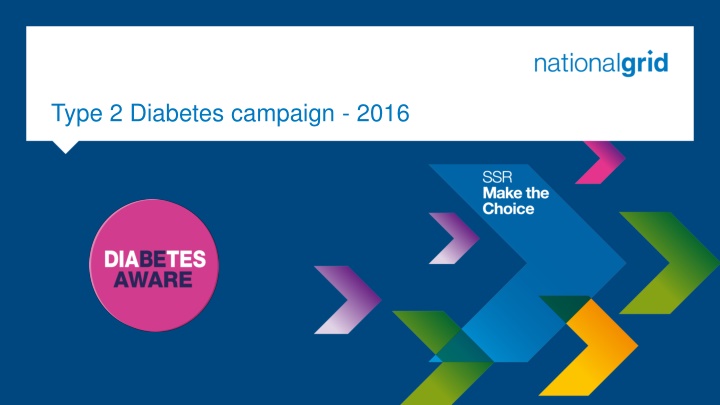
Workplace Interventions for Type 2 Diabetes Awareness Campaign
Discover how workplace interventions can effectively raise awareness of Type 2 diabetes, targeting at-risk individuals by promoting healthier lifestyle choices and early detection through the use of Wellpoint health kiosks. Learn about the impact of the campaign, including results indicating the need for further testing and support for those at medium or high risk.
Download Presentation

Please find below an Image/Link to download the presentation.
The content on the website is provided AS IS for your information and personal use only. It may not be sold, licensed, or shared on other websites without obtaining consent from the author. If you encounter any issues during the download, it is possible that the publisher has removed the file from their server.
You are allowed to download the files provided on this website for personal or commercial use, subject to the condition that they are used lawfully. All files are the property of their respective owners.
The content on the website is provided AS IS for your information and personal use only. It may not be sold, licensed, or shared on other websites without obtaining consent from the author.
E N D
Presentation Transcript
Interventions in the workplace can be effective at changing people s lifestyle behaviours. The workplace offers an opportunity to target hard to reach groups of people and some of those most at risk of disease in society. This year at National grid launched a campaign to increase our employees awareness of Type 2 diabetes. The business case for doing this was powerful
The case for raising awareness Type 2 Diabetes is largely a preventable disease characterised by the body failing to respond correctly to glucose in the blood. This creates a high blood glucose level in the individual which causes the body damage. Image result for globe 4 million people in the UK have diabetes, an increase of 60% in the last 10 years in England and Wales. In 2015 data showed that 415 million people aged 20-70 had diabetes . expected to affect 1 in 10 by 2040 (642 million). New figures, extracted from GP patient data state over 4 million people have the condition in the UK. There are also thought to be 549,000 people with undiagnosed Type 2 diabetes.
Our staff at risk Key risk factors include being overweight and having high blood pressure. Looking at our population data from our Wellpoint kiosks and occupational health results of our operational staff (3 year medicals) show: Over 60% of our office staff (using wellpoint kiosk) are overweight or obese. 70% of the operational workforce are over weight or obese. 1600 staff fall into the obese category making them 80 times more likely to get diabetes than people of a healthy weight. 12% of our field force have high blood sugar (2% higher than the national average). We concluded that we had a substantial population who were at an increased risk of developing diabetes. These figures all added weight to the case for action.
Campaign Aims Improve our understanding of the disease How to spot signs and symptoms Increase use of our Wellpoint health kiosks (Qdiabetes test) How to reduce our risk of developing the disease by making healthier diet and lifestyle choices. Provide glucose testing to help identify people who needed further support.
Results from the campaign Over 1000 people have taken the new Qdiabetes test on our Wellpoint health check machines. These machines check blood pressure, weight, body fat and medical history questions to assess the persons overall health and their risk of developing Type 2 in the next 10 years. The results from these tests showed that of the 1000 who took the test, over 600 people have a medium or high relative risk of developing type 2 diabetes. These people are advised to seek advice from their doctor in order for further testing as early diagnosis is critical to the successful managing of the disease.
Feedback from blood glucose testing Blood glucose testing that we provided at conferences and bigger sites showed 15% of participants were advised to seek referral to their GP for further testing due to elevated glucose in their blood. Image result for glucose test Thank you so much for providing the Wellbeing stand at the Health and Safety Rep's Conference at Edgbaston. If it wasn't for this, I wouldn't have had a test; and I wouldn't have discovered that I had become Type 2 diabetic. I had put the symptoms down to shift work and some other problems I am encountering. Further investigations at the Hospital have confirmed the diagnosis, and, at the moment, I am attempting to control this with diet alone, however, I am not having much joy with this at the moment with blood sugar levels being all over the shop at present. At least we know what the problem is, now. Once more, thank you very much.
The future Development of Wellbeing principles to improve behaviours around the business. E.g. reduction of time sat sedentary (walking meetings, being active at lunch, posture) Use of wearable fitness technology to support increased physical activity Weight management programme Working with our catering suppliers to improve the healthiness of the food sold at catered sites and at external conferences! Continued exposure about the disease health success stories: http://players.brightcove.net/867903724001/default_default/index.html?videoId=5107784653001


